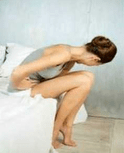One option for urinary tract inflammation - cystitis - this disease with 80% is considered to be a disease of women because of the anatomical characteristics of the female body.
In women, the bladder should be more empty than in men, and is also more susceptible to attack than various germs, bacteria and viruses that can cause cystitis in women.
The symptoms and treatment of this disease directly depend on a number of factors, the nature of the process, location, pathogen of the infection and are classified by:

- According to the location of the inflammatory process in the urinary system - there may be damage to the mucous, muscular or submucosal layer of the bladder.
- By the nature of the course of the disease - acute or chronic.
- According to morphological changes - catarrh, cystic, ulcerative, hemorrhagic, granulomatous, cologne tumor and more.
- According to the pathogen, it can be bacterial (E. Coli, Staphylococci, Streptoccci, Ureapaplasma, Mycoplasma, Gonorrhea, Mycobacterium of Tuberculosis, etc.), Viral, fungal and notradiation), can be caused by protozo (cherlamydy).
With cystitis - which doctor to contact?
Cystitis is quite painful, with rapid urination, burning and acute pain after emptying, with a constant feeling of overflowing of the bladder, low body temperature, sometimes even with the admixture of blood and mucus in the urine.If the woman has the symptoms listed, which doctor to contact?
With cystysis in women, to clarify the diagnosis, you should first contact the urologist, since it is this doctor who is engaged in the diagnosis and treatment of cystitis, for examination it is necessary to perform urine analysis - a general analysis, for bacterial sowing by examination of the unin -human.
In addition, a gynecologist should be visited, as cystitis can often be caused not only by banal bacteria, but also combined with sexually transmitted infections, and therefore a gynecologist examination is needed and the transmission of spreading to the vaginal microflora.With cystic in women, treatment involves both antibiotics and uroseptic, sometimes the doctor can be prescribed by installing the bladder as well as physiotherapy.
Causes of cystitis in women
Most often, the cause of cystic in women is infectious agents, since the nearby location of the vagina, anus, short and rather wide urethra is located until the penetration of various pathogenic microorganisms into the bladder through the ascending paths.However, there are other ways to penetrate the bacteria into the urinary system:
- Up the path is urethral, that is, from the urethra
- descending road - on the contrary, from the upper urinary tract
- Lymphogenic - from other small pelvic organs
- Hematogenous is a rare way of penetrating infection from distant organs.
When a woman has symptoms of cystitis, you should not cultivate yourself, since the causes of cystic, pathogens are a large number and for proper successful treatment you must first determine them, clarify their sensitivity to antimicrobial drugs, and only then prescribe complete treatment.
Cystitis in women is a very rarely isolated process when hygiene, constipation, colds, abuse of acute products or alcohol, the use of bikini - strings, change in the partner, rarely emptying the bladder and more.Causes the reproduction of banal pathogenic bacteria.In 80%, they are E. coli, in 15% Staphylococcus, 5% of other bacteria, such as pseudocan, Klebsiella, Proteus.
- Most often, cystitis occurs against the background of inflammatory processes in the vagina or for diseases of the female genital organs, such as bacterial vaginosis, thrush, diseases are transmitted (gonorrhea, mycoplasmosis, chlamydia, ureplasmosis), sometimes cystics accompany tuberculosis of the female organs.Many hidden infections and tuberculosis for a long time are asymptomatic, imperceptibly, the woman only periodically experiences some discomfort, subfebrile temperature, weakness, does not visit the doctor and does not apply to diagnostic centers to study the causes of mild diseases.
- Additional provocative factors for the development of cystica include pyelonephritis, bladder stones, stagnation of urine in the diverticulus.
- Very often cystitis is found in pregnant women, this is explained by a change in the microflora and vaginal and urological tract under the influence of endocrine and hemodynamic restructuring in the body in a pregnant woman.
- If a woman has diabetes mellitus, frequent manifestations of allergic reactions, she is subjected to constant toxic effects or treats cancer with the help of radiation therapy - these are also risk factors for cystitis.
- Sometimes, after surgical manipulations, surgery, endoscopic examination, the mucosa is wounded, which contributes to the development of cystitis in women.
- Symptoms of cystica also occur during menopause, as atropaic changes in the body and lack of estrogens also affect urogenital pathways in menopause.
In addition to acute cystitis, many women suffer from a chronic inflammatory process against the background of slow infections listed above, or chronic cystitis in women is associated with the leakage of the uterus and vagina.
Symptoms of cystitis in women
After provocative factors such as injury, cold, after unprotected sexual intercourse, infectious disease, etc., in women, acute cystitis may occur, which always begins very abruptly, suddenly:
- Dysuria - rapid urination, rubberized in the bladder, burning and pain in the urethra, a constant desire to empty the bladder.
- Before urinating, a woman usually has to make efforts, pressing.The frequency of desire is so high that a woman should visit the toilet every 15 minutes, sometimes there is an involuntary urinary incontinence.
- NICTURIA is the prevalence of the nightly desire to empty the bladder.
- Pain usually accompanies the onset and end of the urination process.Outside the emptying process, the pain is localized only in the pubic part and perineum.The intensity of the pain may be different, from mild discomfort to unbearable, severe acute attacks.
- Almost always with cystitis in women, urine is muddy, purulent.
- In acute cystitis, the temperature may increase to 38 ° C respectively, weakness, and a deterioration of overall well -being occurs.
- Very often, after the first acute process, recurrence of the disease occurs if acute cystitis develops again a month after treatment, so this indicates the preservation of the infection.
- In chronic cystitis in a woman, the symptoms and treatment of the disease are identical, the pain and the frequency of urination may not be so abruptly.During the exacerbation of the chronic process, a clinical picture of acute cystitis is possible, and during the remission period, neither laboratory nor symptomatic data show an inflammatory process.

Treatment of Cystique in Women
For the treatment of both acute and chronic cystitis in women, you should seek advice from both a gynecologist and a urologist.Usually in acute cystitis with adequate therapy, treatment occurs in a week.
If the infectious nature of cystitis in a woman is confirmed, treatment is a must, aimed at destroying pathogenic microorganisms with antimicrobial agents, antibiotics to which pathogens are sensitive:
- Recently, fluoroquinolones, such as ciprofloxacin, norfloxacin, phosphomycin, nitrofuran, are widely used in women in women.These medicines for the treatment of cystitis in women have side effects and have a number of contraindications, so their use is only possible as prescribed by a doctor.
- If a specific microflora is detected according to analysis, then treatment includes possible antiviral agents, antifungal or antimicrobial agents.
- In severe pain, antispasmodic or non -steroidal anti -inflammatory drugs are prescribed.
- If there are no allergic reactions to medicinal herbs, then you can use different variants of Phyto-One-A-Lingonberry, Field Horsetail, UVA Ursi.It is best to use herbs not in bags, but the form of collection, dust - cook and insist them like any ordinary decoction of medicinal herbs.
- A native antiseptic is an effective treatment for cystitis, quite a single administration of this medicine.
- There are also many plant -born tablets that are used as auxiliary when encouraged with an acute inflammatory process, they should be consumed for a long time for a more resistant effect.The blueberries also help a lot,Cranberry fruit drinksWith cystitis or tablet form of the drug containing cranberry extract.
- In the treatment of cystitis, women should increase the daily amount of fluids drunk from fluid, to quickly eliminate toxins from the body, it is also worth sticking to a lactative diet.
Cystitis Prevention - Useful Tips for Women
- Deflorazione cystitis and a transient urinary tract infection associated with sex life occur with a frequent change in partners if one does not observe hygiene and is not used condoms in sexual contact.
- Compliance with personal hygiene is the key to a lack of recurrence of bacterial cystitis.Use remedies with neutral acid balance for intimate hygiene.
- Control the fullness and timely emptying of the bladder, do not allow prolonged stagnation of the urine.
- The headline, especially the wet legs in cold weather, causes exacerbation.
- Drink at least 2 liters of water, freshly squeezed juices or cranberry fruit drinks every day.
- Do not wear sheep bikinis if you have chronic cystitis when you wear such underwear, the intestinal stick becomes very easy in the urethra.And they also do not wear too tight clothes, jeans, they disturb the normal blood circulation in the pelvis.
- Construction also provokes cystitis relapses, try to include dried apricots, plums, fresh cabbage and other fruits and vegetables in your daily diet.




























